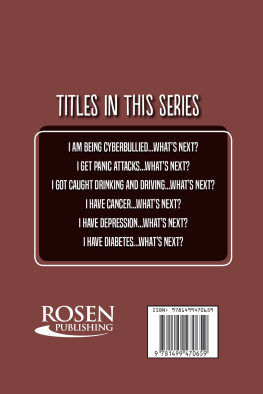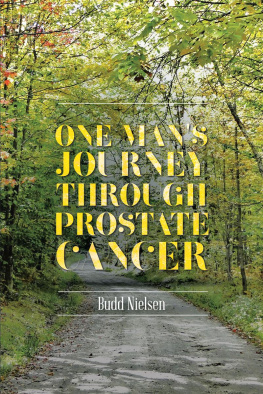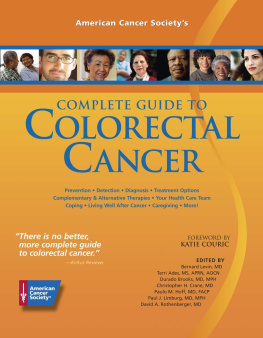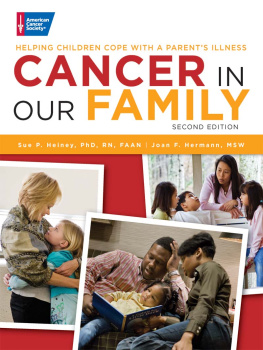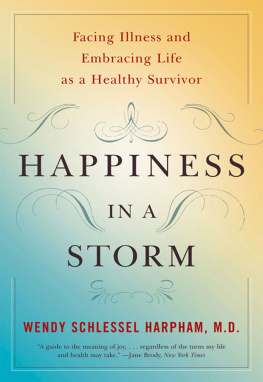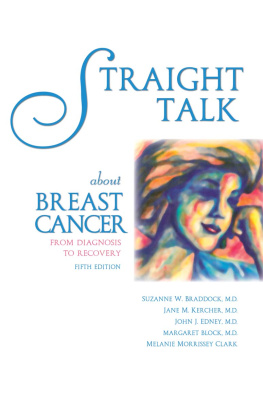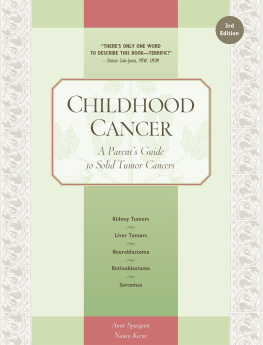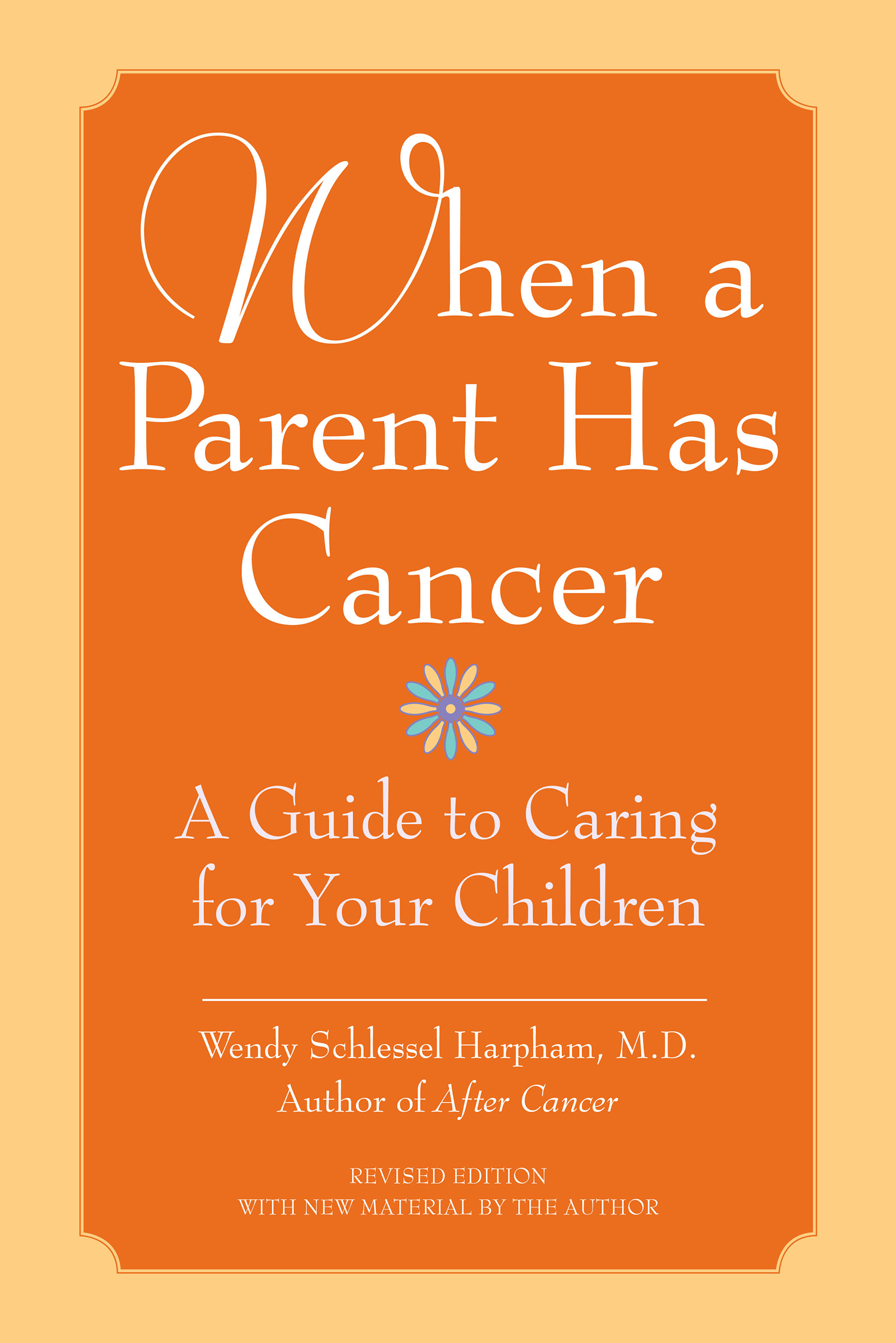W HEN A
P ARENT
H AS
C ANCER
A Guide to Caring
for Your Children
Wendy Schlessel Harpham M.D.

For My Children
R EBECCA A NNE
J ESSICA M ARTHA
W ILLIAM S AMUEL
CONTENTS
PROLOGUE
Our Story
First comes love, then comes marriage, then comes baby in the baby carriage. The limerick to which I jumped rope as a child became a fulfilled prophecy with the birth of Rebecca five years after I married Ted. Two years later, we were blessed with Jessica, and, another two years later, William. Our family now complete, Ted and I knew wed live happily ever after.
For me, happily meant figuring how to balance the demands of my solo practice of internal medicine, Teds career as a university professor, and the ever-changing needs of our growing children. In the fall of 1990, soon after turning thirty-six, I was still climbing the steep slope of the learning curve when I was hospitalized with excruciating leg and back pain.
The day following emergency exploratory surgery, my doctor came into my hospital room and explained that I had non-Hodgkins lymphoma, a cancer of the lymph system. I knew what I had to do because, unlike the average patient, my training as a physician had taught me the ropes of obtaining excellent medical care. Unfortunately for me, I also knew what lay ahead. Id been privy to my patients cancer experiences. Treatment for lymphoma is an ordeal that changes a persons life forever after. When the person survives, that is.
With graphic images flooding my mindbaldness, vomiting, radiation tatoos, hospitalizations, surgeries, and dyingmy first thought was, Oh, no. My children, my children. I was overwhelmed by the thought of them, not yet two, four, and six years old, suffering emotional damage because of my illness. The idea of them possibly losing me was unbearable.
I wasnt the only one traumatized. While I was lying in the cocoon of my hospital bed, focused on my leg pain and fear of dying, Ted was dealing with the normal world and our very normal children. Ted told me how he drove home alone from the hospital after learning of my diagnosis. He was dazed, afraid, and worried when he was greeted at the door by our three little ones. While his heart told him to devote himself totally to me, his intellect commanded him to tend to the children. Rebecca, Jessica, and William needed him too, although in different ways.
Instinctively, Ted swore to himself two things: First, not to lie to our children. My illness was going to be a long-term affair and he needed their trust. And second, to try not to think about me when he was with the children because they needed his undivided attention. Our shocking news was their crisis, too, as life-altering for them as it was for us. Ted sat down and told them the news, gently and simply.
Life with cancer and treatments was not easy. During the months following my diagnosis, routine matters such as changing diapers, doing laundry, providing daily meals, and fulfilling car pool obligations were accomplished only with the help of friends and family. Special occasions, such as school plays and ballet recitals, drained physical energies when I could attend, and emotional reserves when I couldnt. My own anxiety, fear, and fatigue made the normally challenging ups and downs of rearing children even more so.
How could I possibly be a good parent under such oppressive circumstances? The answer began with accepting that I did not have a choice about cancer entering our lives, and deciding to see my illness as a strengthening force for my family. With these first two steps, something magical happened: in certain ways, parenting became easier than it had ever been before. By making me painfully aware of the fragility of life, cancer clarified my parental duties, restructured my priorities, and taught me how to live in the present, in my childrens current moment. The dreaded cancer invading my body inspired me to embrace the parenting I could do each day and generated an urgency to create a wealth of life-enhancing examples and experiences. The way I saw it, the lessons and loving memories the children stored of our todays were my insurance that they would grow strong and feel my love through all their tomorrows, no matter what happened to me.
Nurturing Rebecca, Jessica, and William nourished me. Daily hugs and developmental milestones became celebrations I felt a thousand times over. Unwanted circumstances became opportunities to teach them values and demonstrate unconditional love. Spilled milk, rained-out picnics, and skinned knees became welcomed occasions to help them learn how to deal with stress, change, and loss.
This magic did not happen overnight. A few weeks after my diagnosis, my childrens delight in the flickering Chanukah candles triggered great anxiety in me: They might kindle lights without me next year. Far from savoring the seasonal love and joy, I was swallowed by fear, anxiety, and grief.
Later that evening, when Rebecca got out of bed for the twenty-millionth time and came into our room, I saw her beautiful, doll-like silhouette as an annoying intrusion, preventing me from getting the attention and rest that I needed. Half-scolding, half-pleading, I led her back to bed, tucked her in one more time, and said between clenched teeth, Darling, if you cant fall asleep, look at your picture books for awhile. But please stay in bed. I need time with Daddy. What I was thinkingin fact, screamingin my head was, Dont you know that I have cancer? I feel miserable. Im upset. Why cant you just take care of yourself and leave me alone?
Although my belief in the potential positive power of my illness was born within weeks of my diagnosis, the magic was a gradual process that depended on me, and not the swish of a fairys wand. I had to learn how to live with my disease and better understand how to raise my children. Even after I felt empowered to parent well, not every hug or smile was appreciated, let alone celebrated. There were times when my own emotions or physical sickness kept me from saying or doing what I knew to be the right thing. Through it all, the best I could do was the best I could do.
Ted and I spent considerable time discussing how to educate our children about my health situation in particular and about cancer in general without making them afraid. One of our biggest problems was determining the needs of each child. My two-year-old, William, had very few special needs and no concept of the significance of my illness. For him, cancer simply meant Mommy was home more, a good thing, all things considered. Four-year-old Jessica needed extra physical contact and had a real sense that this illness was important. But she lacked the maturity to really understand what was going on, or why it was out of the ordinary. Rebecca also needed extra physical closeness, but her need for emotional reassurance was even greater. At six, she grasped from the beginning the seriousness of my leg pain and my not being able to work. She was just beginning to understand and worry about the concept of death, and gradually came to understand the life-threatening nature of my illness. The usual adventures of kindergarten became more emotional and complicated in the setting of cancer.
While teaching my children about cancer, I did my own research. During the seven months of chemotherapy, I distracted myself from the discomforts and stresses of the treatments by reading much of the professional and lay literature on cancer and then writing about this common illness. This diversion into writing was self-healing both for what I gained in knowledge, insight, hope, and comfort and for what I could give to others. Too sick to care for patients in my office, I could fulfill my childhood dream of being a physician through books.


